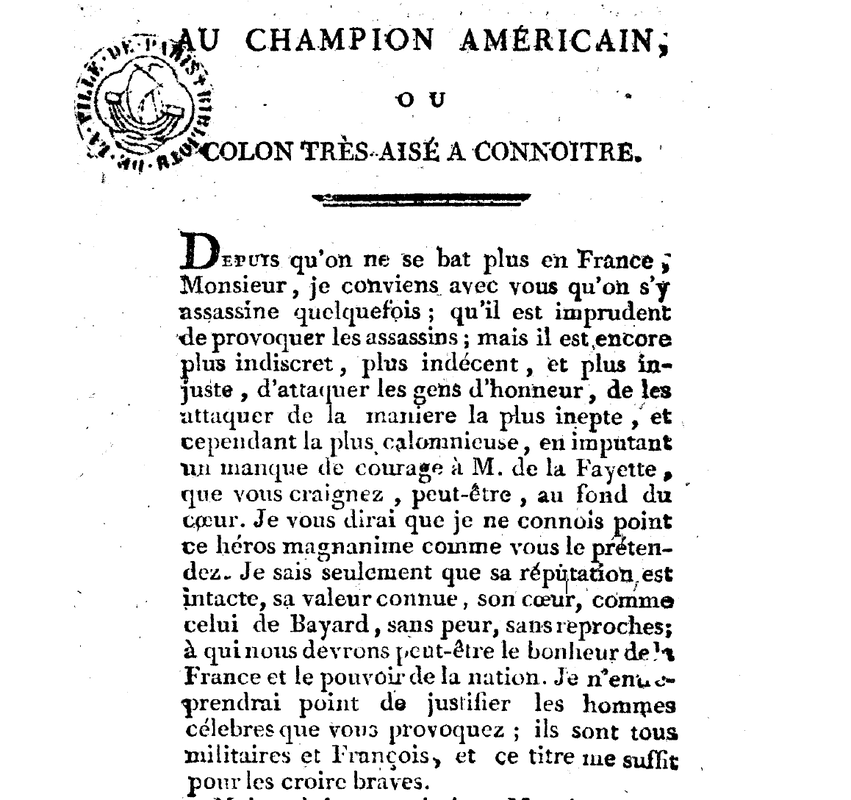|
In 1783 Olympe wrote her first play, Zamore et Mirza, ou l’heureux naufrage, and submitted to the Comédie Française. The actors liked it and accepted it. Unfortunately, her later dispute with Beaumarchais over Le Marriage Innatendu de Chérubin, meant that the Comédie just sat on her play and refused to put it on. The contract she had signed with them meant that it could not be played elsewhere in Paris. So Olympe took the play elsewhere, with her own theatrical troup, which included her son, and performed it in private theatres and in the provinces. In 1786, she had the play printed for the fist time. Two years later, she printed it again, with a postface, her “Réflections sur les hommes nègres” in which she explained what the philosophy behind the play was. Why are black people treated like animals, she asked? [I] clearly observed that it was force and prejudice that had condemned them to this horrible slavery, that Nature had no part in it and that the unjust and powerful interest of the Whites was responsible for it all. In 1788, Olympe was already sensing a change for the better in politics, and felt it her duties to show the world that if they wanted to redress injustice, slavery was the place to start: When will work be undertaken to change it, or at least to temper it? I know nothing of Governments' Politics, but they are fair, and never has Natural Law been more in evidence. They cast a benevolent eye on all the worst abuses. Man everywhere is equal. As she pointed out in January 1790, in an open letter to an (anonymous) American colonist attacking her play, at the time she wrote Zamore and Mirza, there was no organised French abolitionist movement. The Societé des Amis des Noirs did not yet exist. She ponders in that letter, whether it was her play that caused Brissot and the others to create that society, or whether it was just a happy coincidence: I can therefore assure you, Sir, that the Friends of the Blacks did not exist when I conceived of this subject, and you should rather suppose that it is perhaps because of my drama that this society was formed, or that I had the happy honour of coincidence with it. In fact, Brissot did take note of the play, and in the winter 1789, he made use of his growing influence to persuade the actors of the Comédie Française, finally to put it on. Unfortunately, the actors bore a grudge, so they arranged for the play to be put on on the last day of the year, after which Parisians would be returning to their family homes to celebrate the New Year. The contract required that a play make a certain amount of money in the first three days if it was to stay on the program. The first night was a success – but a political rather than an artistic one. People came to support it and to protest against it, and they were so loud about it, that few could hear the actors. Fortunately the text was in print, and reviewers at the time noted that they’d had to refer to the printed version to know how the play ended. Those who protested against the play most vociferously were the colonists, who had strong financial interest in the laws regarding slavery staying as they were. One such colonist wrote to Gouges, imputing that she was but the tool of Brissot’s society, and that her play was a call for the slaves of America to revolt. Gouges responded in an open letter, (1790) arguing, as we saw, that it was she, not Brissot, who’d first given voice to the abolitionist in France, and that her play did not incite revolution, but that it enjoined the French people and the colonists to see that all men were equal and abolish slavery, and the slaves to trust in the new laws and wait for a better future. Two years later, these accusations came back when the slaves and the free people of colour of Saint-Domingue revolted.
0 Comments
|
About
This is where I live blog about my new book project, an intellectual biography of three French Revolutionary women philosophers. Categories
All
Archives
November 2022
|

 RSS Feed
RSS Feed